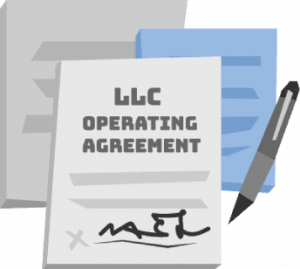How to Start an LLC in South Dakota
Starting a an LLC takes a few steps: naming your business, designating a South Dakota registered agent, and filing the Articles of Organization form and $165 fee ($150 if filing online) with the South Dakota Secretary of State. But after forming your company, you’ll need to do a few more things to stay compliant and cover your legal bases.
In this guide, we’ll walk you through everything you need to create an LLC, as well as what to do after your LLC is officially in business.

1. Name Your LLC
First up, naming your LLC! You can’t file your paperwork without knowing what the name of your business will be. South Dakota’s LLC naming rules are outlined in SDCL § 47-43A-105. Specifically, these rules say your LLC’s name must:
- Include an indicator like limited liability company, L.L.C., or LLC.
- Be distinguishable (different) from any other business name registered in South Dakota.
If you know exactly what you want to call your LLC and are ready to file your Articles of Organization, find out if it’s available. And if you’re not ready to form an LLC yet, you can reserve your business name as long as 120 days for $25.
A DBA (Doing Business As name) is any name other than your LLC’s legal name. There’s lots of reasons to use a DBA. Whether you want to use a different name on official documents or to market specialized products or target a new audience. South Dakota requires anyone using a DBA to register with the Secretary of State via the state’s E-Filing System. Registering a DBA in South Dakota costs $10.
Create Your South Dakota LLC!


2. Register Your Domain Name
After choosing your LLC’s name, a good next step is locking down a domain name for your business website. Your domain name (URL) is the web address to your site.
A professional domain name should be easy to remember—and ideally, match or complement your business name. When you register your domain name early, you’re more likely to get a name that meets those standards.
You’ll need to claim a business domain name through a registrar. When you hire Northwest to form your LLC, domain registry is one of many in-house services we provide, so you also get a domain name free for a year, plus your own customizable business website secured with SSL protection, and up to ten email business addresses connected to that domain.

3. Designate a Registered Agent
South Dakota law requires every LLC in the state to name a registered agent. The registered agent is someone (yourself, another individual, or a company like Northwest) that can accept legal mail on behalf of your business. You’ll need to know your registered agent’s name and physical address before filling out your LLC Articles of Organization.
The requirements for a registered agent in South Dakota are set in SD Codified Laws § 59-11-6. In addition to accepting legal mail on your behalf, your registered agent needs to:
- Have a physical address in South Dakota (a P.O. Box won’t work!).
- Be available at that address during regular business hours.
Learn why the pros use a registered agent service.
One hundred percent. You can be your own registered agent in South Dakota if you meet the criteria listed above, and you’re not bothered by the idea of listing your personal information on the public record. You’ll also need to keep regular business hours at your registered agent address to be available to accept legal mail in person (which means it might not be a great choice if your job requires you to do a lot outside your office).
Yes. You can change your registered agent in South Dakota at any time. Just file a Statement of Change of Registered Agent form with the South Dakota Secretary of State for $10.

4. Submit LLC Articles of Organization
To officially create your LLC, you’ll need to file Articles of Organization with the South Dakota Secretary of State and pay a formation filing fee. All the information you supply in your Articles of Organization becomes part of the public record.
To complete the form, you’ll need to list the following information:
- Company name: include the words limited liability company or an abbreviation thereof.
- Purpose: This is an optional part of the paper form where you can designate a business purpose.
- Initial designated office: This is your main business address and it must be a street address. You can also add a mailing address and an email address.
- Registered agent: the person or company that you’ve named to accept legal mail on behalf of your LLC. If you appoint a commercial service (like Northwest!) as your LLC’s agent, you’ll also need to provide a CRA number, which you can get from your registered agent.
- Organizer information: the name and address of the person who signs and submits this form. The organizer can be someone from outside your LLC.
- Duration: You can optionally specify an end date for your LLC to dissolve.
- Management: Check a box to indicate whether your LLC will be managed by members or managers.
- Manager information: Manager-managed LLCs must list the name and address of each manager.
- Extra provisions: One last optional section, where you may attach extra information or provisions to add to your Articles.
- Organizer signature: Each person completing and submitting this form must sign and date the form.
The fee to file Articles of Organization with the South Dakota Secretary of State is $150 when you do it online. If you’re filing with a paper form by mail or in person, the fee is $165.
After the South Dakota Secretary of State receives a paper form, it usually takes three to five business days to process the filing and create the LLC. Online filings are processed as soon as they’re received.
You can submit your Articles of Organization to the South Dakota Secretary of State by mail, in person, or online.
By mail or in person:
South Dakota Secretary of State
500 E Capitol Ave.
Pierre, SD 57501
Any information listed on your LLC’s Articles of Organization will be readily available online. This makes it easy for junk mail and spammers to find names, personal addresses and phone numbers.
Hire Northwest, and we’ll list our business address wherever we can on this form, so you can keep your address private and avoid risking being targeted by opportunistic spammers and scammers.
Your Articles of Incorporation are Filed. What's Next?

Write an LLC Operating Agreement
Your LLC needs an operating agreement, a legally binding document that establishes how your LLC is organized and how it will function. The operating agreement covers important, big-picture stuff. In this document you’ll define topics like how voting works in your company, how profits are allocated, and how you’ll proceed if you need to dissolve the business. You don’t have to file your operating agreement with the Secretary of State, as it’s an internal document that you should keep on file with your business records.
Check out our attorney-drafted Operating Agreement.
South Dakota doesn’t legally require your LLC to have an operating agreement. However, a clearly written operating agreement is super important for any LLC. Without one, your business will be required to operate under South Dakota’s default LLC statutes, leaving you with less control over your company.
A solid operating agreement will plan for every major situation your LLC is likely (and unlikely) to face. Here’s a list of the topics most operating agreements address:
- initial investments
- profits, losses, and distributions
- voting rights, decision-making powers, and management
- transfer of membership interest
- dissolving the business
Yes. Without an operating agreement, a single-member LLC can look a lot like a sole proprietorship (a business type without liability protection) in the eyes of a court, should you ever face a lawsuit. And although you probably won’t need an operating agreement to resolve an argument with yourself, you will almost certainly need one to open a bank account for your business.

Get an EIN, Bank Account & Funding
It’s no surprise that your LLC can’t operate without money. And in order to keep your LLC’s limited liability and remain a legally distinct entity from its members, you’ll need to open a business bank account. Generally, that means you’ll also need to get an EIN (Employer Identification Number) to open that account (unless you have a single-member LLC and don’t mind giving out your social security number).
Once your business bank account is formed, your LLC then can fund it. Each member should make an initial deposit to the business account. The amount they contribute will determine their membership interest (percentage of LLC ownership).
You can apply for an EIN from the IRS for free, either online or by mail. Filing online is fastest, but only available if you have a social security number. Otherwise, you’ll need to file by mail.
When you hire us to form your LLC, Northwest can file your EIN application for you.

File Taxes & Reports
There are specific tax and reporting requirements your LLC needs to meet. Here’s how they all stack up:
- Taxes: In South Dakota, like all other states, LLCs are taxed as pass-through entities by default. That means LLCs usually don’t pay income tax as a business. Instead, profits pass through the LLC as distributions to the owners (members), who then report the profits as earnings on their personal tax filings. Profits are subject to the federal self-employment tax rate (15.3%).
- Annual reports: South Dakota requires LLCs to file a yearly report on your LLC’s current ownership and contact information. This annual report costs $50 to file online, or $65 to file by mail or in person. If you’re worried you’ll forget to file, let us handle your annual report for you.
All LLCs operating in South Dakota must file annual reports, which are due yearly by the end of the anniversary month in which your LLC was formed.
By default, LLCs in South Dakota are taxed as pass-through entities, but can also elect to be taxed as an S-corp or C-corp by filing paperwork with the IRS.
Learn more about S-Corp vs LLC tax designation.
*This is informational commentary, not advice. This information is intended strictly for informational purposes and does not constitute legal advice or a substitute for legal counsel. This information is not intended to create, nor does your receipt, viewing, or use of it constitute, an attorney-client relationship. More information is available in our Terms of Service.
Ready to Start an LLC in South Dakota?






